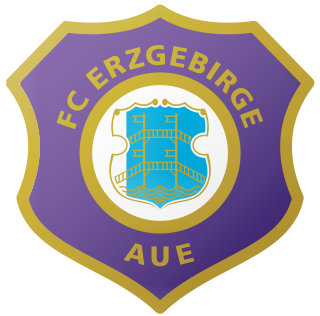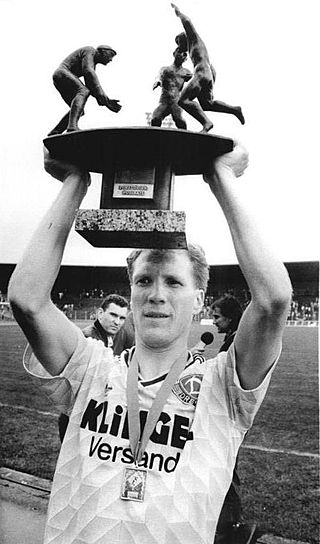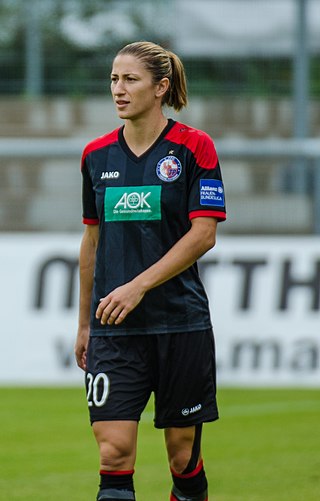Women's association football clubs in the German Democratic Republic were first established in the late 1960s. While local leagues began in 1970, a national championship was first held in 1979 and a cup was not played until 1987.
Women's association football clubs in the German Democratic Republic were first established in the late 1960s. While local leagues began in 1970, a national championship was first held in 1979 and a cup was not played until 1987.
In 1968, the Bulgarian student Vladimir Zvetkov founded the first women's team as a section of BSG Empor Dresden-Mitte (today Dresdner SC). While several local functionaries were opposed to the idea of women playing football, Zvetkov was eventually allowed to pursue his idea. The first women's football game in the GDR was held on 4 August 1969. Dresden defeated Empor Possendorf 2–0 in front of 1,600 spectators.
Since women's football was not an Olympic sport, and thus had little prestige, the local authorities did not patronize the sport, instead treating it as a mere recreational activity. Despite this lack of governmental interest, the pioneers from Dresden were able to set up an eight-team league in 1970. By the end of 1971, the number of women's football teams in East Germany had grown to 150. Supra-regional competitions were refused for several years until, in 1979, a national championship was held for the first time. A cup competition was inaugurated in 1987 and a national league was founded in 1990, the year before German reunification was completed. The national football team was organized in 1989, its only game being a 0–3 defeat at the hands of Czechoslovakia on 9 May 1990 in Potsdam.
After the 1990–91 season, the clubs from the former GDR were integrated into the German Football Association. The top two finishers from the only Oberliga season, USV Jena and Wismut Aue, were assigned spots in the Bundesliga, but both were immediately relegated. In 1994, former GDR club Turbine Potsdam was promoted to the Bundesliga and has since won every major honour in women's club football, including the UEFA Cup in 2005.
| n/a | No final was held |
| Year | Champions | Result | Runners-Up | Location |
|---|---|---|---|---|
| 1979 | Motor Mitte Karl-Marx-Stadt | n/a | BSG Aufbau Dresden-Ost | Templin |
| 1980 | BSG Wismut Karl-Marx-Stadt | n/a | Aufbau Dresden-Ost | Bad Blankenburg |
| 1981 | BSG Turbine Potsdam | n/a | BSG Chemie Wolfen | Babelsberg |
| 1982 | BSG Turbine Potsdam | n/a | Chemie PCK Schwedt | Lauchhammer |
| 1983 | BSG Turbine Potsdam | n/a | BSG Wismut Karl-Marx-Stadt | Schwedt |
| 1984 | BSG Motor Halle | n/a | BSG Turbine Potsdam | Colditz and Grimma |
| 1985 | BSG Turbine Potsdam | 2–0 | BSG Wismut Karl-Marx-Stadt | Markkleeberg |
| 1986 | BSG Turbine Potsdam | 4–1 | BSG Motor Halle | Dresden |
| 1987 | BSG Rotation Schlema | 4–1 | BSG Wismut Karl-Marx-Stadt | Kamenz |
| 1988 | BSG Rotation Schlema | 3–0 1–3 | BSG Turbine Potsdam | Aue Babelsberg |
| 1989 | BSG Turbine Potsdam | 3–1 2–3 | BSG Rotation Schlema | Babelsberg Aue |
| 1990 | BSG Post Rostock | 6–1 4–2 | BSG Wismut Chemnitz | Chemnitz Rostock |
| 1991 | Uni SV Jena | n/a | FC Wismut Aue |
The Democratic Women's League Cup (German: Pokal des Demokratischen Frauenbundes) was held from 1987 to 1991. As the name suggests, the cup was funded not by the football association, but by the Democratic Women's League of Germany. Little information is available about the competition. In particular, for the first two seasons, only the winners are known. In the competition's short history, only Rotation Schlema was able to win the title twice.
| Year | Champions | Result | Runners-Up | Location |
|---|---|---|---|---|
| 1987 | Rotation Schlema | –:– | unknown | unknown |
| 1988 | Wismut Karl-Marx-Stadt | –:– | unknown | unknown |
| 1989 | Rotation Schlema | 1–0 | HSG Uni Jena | Berlin |
| 1990 | BSG Post Rostock | 0–0 (aet) 5–3 (pso) | Wismut Chemnitz | Senftenberg |
| 1991 | Wismut Aue | 2–0 | SSV Turbine Potsdam | Hettstedt |

FC Hansa Rostock is a German association football club based in the city of Rostock, Mecklenburg-Vorpommern. The club is also called as "the cog" because of its club crest. They have emerged as one of the most successful clubs from the former East Germany after German reunification and have made several appearances in the top-flight Bundesliga. With 21,416 club members, the club is one of the largest sports clubs in Germany.

The DFB-Pokal is a German knockout football cup competition held annually by the German Football Association (DFB). Sixty-four teams participate in the competition, including all clubs from the Bundesliga and the 2. Bundesliga. It is considered the second-most important club title in German football after the Bundesliga championship. Taking place from August until May, the winner qualifies for the DFL-Supercup and the UEFA Europa League unless the winner already qualifies for the UEFA Champions League in the Bundesliga.

The DDR-Oberliga was the top-level association football league in East Germany.

Matthias Sammer is a German football official and former player and coach. He played as a defensive midfielder and later in his career as a sweeper.

Sportgemeinschaft Dynamo Dresden e.V., commonly known as SG Dynamo Dresden or Dynamo Dresden, is a German association football club based in Dresden, Saxony. They were founded on 12 April 1953 as a club affiliated with the East German police and became one of the most popular and successful clubs in East German football, winning eight league titles.

Football is the most popular sport in Germany. The German Football Association is the sport's national governing body, with 6.6 million members organized in over 31,000 football clubs. There is a league system, with the Bundesliga, 2. Bundesliga and 3. Liga on top. The winner of the Bundesliga is crowned the German football champion. Additionally, there are national cup competitions, most notably the DFB-Pokal and DFL-Supercup.

1. Frauenfußballclub Turbine Potsdam 71 e. V., commonly known as 1. FFC Turbine Potsdam, is a German women's football club located in Potsdam, Brandenburg. They are one of the most successful women's football teams in Germany, having won six Frauen-Bundesliga championships and two UEFA Women's Champions League titles. They play in the Karl-Liebknecht-Stadion in the Babelsberg district of Potsdam, and their biggest rivals are Eintracht Frankfurt.

Fußball Club Erzgebirge Aue e.V., commonly known as simply FC Erzgebirge Aue or Erzgebirge Aue, is a German football club based in Aue-Bad Schlema, Saxony. The former East German side was a founding member of the 3. Liga in 2008–09, after being relegated from the 2. Bundesliga in 2007–08. The city of Aue-Bad Schlema has a population of about 20,800, making it one of the smallest cities to ever host a club playing at the second highest level of German football. However, the team attracts supporters from a larger urban area that includes Chemnitz and Zwickau, whose own football sides are among Aue's traditional rivals.

Dresdner Sportclub 1898 e.V., known simply as Dresdner SC, is a German multisport club playing in Dresden, Saxony. Founded on 30 April 1898, the club was a founding member of the German Football Association in 1900. The origins of the club go back still further to the predecessor side Dresden English Football Club formed in 1874 by expatriate Englishmen as Germany's first football club and possibly the earliest in continental Europe: Dresdener SC was organized by one-time German members of the EFC.

FC Bayern Munich is a German professional women's football team based in Munich, Bavaria. They currently play in the Frauen-Bundesliga, the top women's league in Germany.

The FDGB-Pokal was an elimination football tournament held annually in East Germany. It was the second most important national title in East German football after the DDR-Oberliga championship. The founder of the competition was East Germany's major trade union.

Eintracht Frankfurt is a German women's association football club based in Frankfurt. Its first team currently plays in the German top flight, Frauen-Bundesliga. From 1998 to 2020, the club was known as 1. FFC Frankfurt.

Football in Berlin, the capital of Germany, has a long history. The city contributed 24 of the 86 founders of the DFB, the German Football Association. The DFB Cup Final has been held every year at the Olympiastadion since 1985.
The history of German football is one that has seen many changes. Football was a popular game from early on, and the German sports landscape was dotted with hundreds of local sides. Local sports associations or clubs are a longtime feature of the culture of German athletics. Each club would participate in, and field teams from, one or more sports, depending on local interest and resources.

FSV Optik Rathenow is a German association football club who compete in the Oberliga. The club is situated in the city of Rathenow, near Berlin, and play their home games at the Vogelgesang.

Bianca Ursula Schmidt is a German footballer. She plays as a defender for FC Rosengård and the German national team.

The football league system of the German Democratic Republic existed from 1949 until shortly after German reunification in 1991.
The rivalry between football teams from East Germany and West Germany lasted from 1949 to 1990.